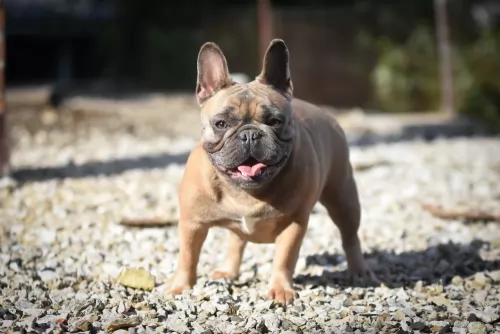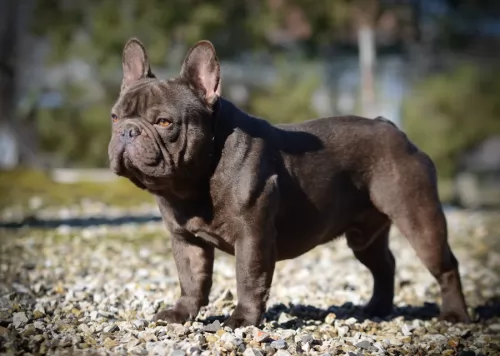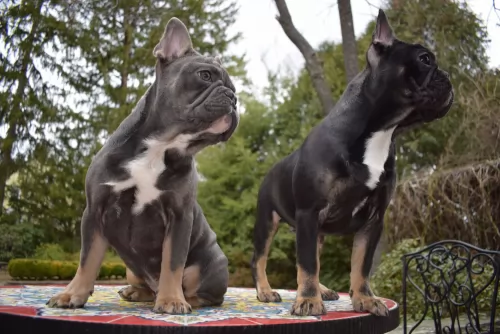 Petzlover
Petzlover French Bulldog is originated from France but Jug is originated from United Kingdom. Both French Bulldog and Jug are having almost same height. French Bulldog may weigh 7 kg / 16 pounds more than Jug. French Bulldog may live 5 years less than Jug. Both French Bulldog and Jug has almost same litter size. Both French Bulldog and Jug requires Low Maintenance.
French Bulldog is originated from France but Jug is originated from United Kingdom. Both French Bulldog and Jug are having almost same height. French Bulldog may weigh 7 kg / 16 pounds more than Jug. French Bulldog may live 5 years less than Jug. Both French Bulldog and Jug has almost same litter size. Both French Bulldog and Jug requires Low Maintenance.
 The french bulldog originated in England and are bred expecting small size bulldogs. Many lace workers in Nottingham had little bulldogs and when they emigrated to france, they brought their dogs with them. Soon they become popular in France and Europe. Then Americans showed interest in them.In 1896 frenchie was shown in United states in a show and after that they got their nickname "Frechie".
The french bulldog originated in England and are bred expecting small size bulldogs. Many lace workers in Nottingham had little bulldogs and when they emigrated to france, they brought their dogs with them. Soon they become popular in France and Europe. Then Americans showed interest in them.In 1896 frenchie was shown in United states in a show and after that they got their nickname "Frechie".
 The Jug is a crossbreed – a mix of a pug and a Jack Russell Terrier and they were bred in England with the idea to keep the basic features of a pug but just with a longer nose.
The Jug is a crossbreed – a mix of a pug and a Jack Russell Terrier and they were bred in England with the idea to keep the basic features of a pug but just with a longer nose.
Details on the origin of the dog are not altogether clear but the dog was developed so that it would reduce the breathing problems that pugs and other flat-faced breeds are known for.
This isn’t an old breed and development started around the 1960s. It is one of the most recent breeds to be registered by the American Canine Hybrid Club.
 Frenchie is a good companion dog and has a powerful muscular body. They like to play but also likes to relax for more time. They are intelligent and training them is very easy until they think it a game. They are free thinkers and are not very good in obedience. Frenchies should not be leaved alone for a long time.They love spending time with humans and generally they get along with everyone. They are excellent watchdogs and alerts when strangers come.
Frenchie is a good companion dog and has a powerful muscular body. They like to play but also likes to relax for more time. They are intelligent and training them is very easy until they think it a game. They are free thinkers and are not very good in obedience. Frenchies should not be leaved alone for a long time.They love spending time with humans and generally they get along with everyone. They are excellent watchdogs and alerts when strangers come.
French bulldog suits very well in apartments. But they should be made to walk for fifteen minutes daily to avoid over weight. They should not be kept outside on hot days. Frenchies will be very happy if you stay in home. They will follow you wherever you walk inside the house. They love people so much, such that people who own a Frenchie can not imagine life without them.
 The Jug will usually end up having a round head with the typical short muzzle of the Pug. He may be somewhat lighter in build than the Pug, taking more after the Jack Russell in this regard.
The Jug will usually end up having a round head with the typical short muzzle of the Pug. He may be somewhat lighter in build than the Pug, taking more after the Jack Russell in this regard.
The way the dog turns out will depend on which dog the puppy takes after. He is a small breed dog standing at between 25 to 36cm at the withers and weighing 5 to 7kg.
When it comes to coat color you'll find they can vary between fawn, black, apricot and sometimes a blend of two colors. While pugs come with smoothish coats, the Jack Russell can either have a smooth or rough coat and your Jug could inherit either a smooth or rough coat.
He could inherit the Pug’s flat, somewhat wrinkled face while others may have a slightly longer muzzle. The eyes are large and the ears are floppy. The legs are short and the tail will no doubt be left long these days and be slightly curled.
The tenacious, fearless, intelligent nature of the Jack Russell Terrier mixed with the entertaining, amicable nature of the pug has brought out the Jug dog with a whole lot of excellent qualities of both dog breeds.
They are loving, loyal dogs and when they are trained and socialized they get on particularly well with both pets and children in the the home. He is intelligent and will be able to learn some simple commands such as sit, stay and lie down.
 They are good children friendly dogs as they like to play with them. It will be good if they are supervised by an adult.
They are good children friendly dogs as they like to play with them. It will be good if they are supervised by an adult.
They are polite with everyone including other pets. They love to play games and chase balls but don't need much exercise.
Frenchies adapts well for apartment living but they don't like being alone for long time. They will not tolerate both hot and cold weather and so air conditioning will be better.
French Bulldogs are easy to train and are very much interested in playing.
 Jugs are wonderful little dogs and they make a good choice for first time dog owners as they don’t come with any difficult characteristics.
Jugs are wonderful little dogs and they make a good choice for first time dog owners as they don’t come with any difficult characteristics.
They’re playful, intelligent, energetic and amicable and just love to please their human family. Because of his small size, he is also an adaptable dog, being able to settle down in the city or the country, as long as he is given enough mental- and physical exercise to prevent boredom and frustration.
Provide the right environment for your Jug and you’ve got an awesome canine friend for life.
 Frenchies can suffer from Von Willebrand's disease(VWD)and thyroid condition. Due to their flat faces they suffer from elongated soft palate or cleft palate. Because of their compacted air way they have inability to effectively regulate temperature.
Frenchies can suffer from Von Willebrand's disease(VWD)and thyroid condition. Due to their flat faces they suffer from elongated soft palate or cleft palate. Because of their compacted air way they have inability to effectively regulate temperature.
Any indication that the hair is unhealthy, such as brittleness and hair loss, should be addressed immediately to avoid any further damage. Hair loss becomes a problem when it becomes excessive, possibly due to disease or a particular condition.
 Your jaunty little Jug can live anything from 12 to 20 years when looked after well.
Your jaunty little Jug can live anything from 12 to 20 years when looked after well.
Just like with any other dog however, he can become ill, and then you will need to get him to the vet as soon as possible. Allergies, breathing problems, bloat, primary lens luxation, skin disorders, deafness, cardiomyopathy and obesity are just some of the common dog diseases that your Jug might have to deal with.
Because one of the dogs used in the development of the Jug is a Pug, as a brachycephalic breed, they could suffer with breathing problems. The Jug which inherits the shorter muzzles can suffer from a condition known as Brachycephalic Airway Syndrome.
Some Jugs can have the large, protruding or bulbous eyes of the Pug. With an eye problem known as Entropion, the lid of the eye can turn inward so that the eyelash pushes into the eyeball, causing lots of redness, discharge and irritation. This can lead to an infection in the eye. You may notice your Jug constantly pawing at his eye.
This can be a real problem for your Jug and the extra weight will put additional strain on the dog’s heart and other organs and also affect his overall health and wellbeing.
 As with all dogs, proper nutrition makes your French Bulldog a happy, healthy pup. He should have his own food and water bowls. Don't feed your French bulldog puppy, uncooked meat or food that may have gone bad. Young puppies need relatively large amount of food in order to meat the demands of their rapidly growing bodies and their hectic lifestyle. Feed your puppy specially designed chewing treats from reputable pet stores.
As with all dogs, proper nutrition makes your French Bulldog a happy, healthy pup. He should have his own food and water bowls. Don't feed your French bulldog puppy, uncooked meat or food that may have gone bad. Young puppies need relatively large amount of food in order to meat the demands of their rapidly growing bodies and their hectic lifestyle. Feed your puppy specially designed chewing treats from reputable pet stores.
According to the French BullDog Club of America, there are no specific guidelines for feeding them. Options for feeding your French Bulldog are commercial dry food, canned food, raw food and homemade meals. Calories required for frenchie varies depending on size, age, activity level and metabolism.
Frenchies can be made to walk or run for a particular distances. Heavy exercises should not be given as they face respiratory problems. Avoid exercising them in hot weather as they have chances of getting heatstroke.
 Small he may be, but the Jug is an energetic little dog who will require exercising to keep him content. Toys to chew on are good and you can take him for walks too. Throw a ball for him or let him tug on a rope.
Small he may be, but the Jug is an energetic little dog who will require exercising to keep him content. Toys to chew on are good and you can take him for walks too. Throw a ball for him or let him tug on a rope.
To keep your little Jug healthy and happy, you want to be sure that his diet is made up of a balanced mix of vitamins and minerals. If you feed him a commercially manufactured food, make sure that its one of the best ones free of toxic colorants and preservatives.
Check on the packaging for portion sizes for your pet. Give him some home-made food too such as cooked chicken, rice, pasta and vegetables and try to also include some raw meat mixed into his kibble from time to time. Fresh, cool water should always be included day and night.
With healthy food, your Jug can make it to 17, 18, 19 or 20 years of age even. Remember that anytime you get a pet, you can check with your veterinarian for dietary recommendations.
The Jug can shed quite a bit, particularly if he inherited more of the Pug coat. Make sure you brush his coat at least twice a week to rid him of loose hairs. Brushing also strengthens the bond between you and your pet.
Recognize the signs of an ear problem. These can be redness or swelling, ear scratching, head shaking or ear discharge.
To keep his teeth and gums healthy you can provide him with safe, appropriate toys to chew on as well as dental chews recommended by your vet.
Check your dog’s eye health. Signs of an eye problem are eye discharge and redness. Take your pet to the vet as soon as possible and try and remove hair around the eye that could be causing irritation.